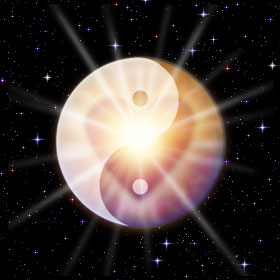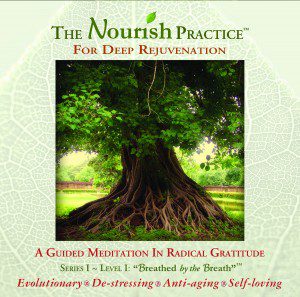Contributing Writer for Wake Up World
Many view love as a purely positive force. It is positive, but for love to live up to its advertising as the most powerful energy on the planet, it must be bigger than the feel-good experience we claim it to be. Love must embrace everything from euphoria to devastation, selflessness to utter selfishness, on both the personal and collective level. For love to be the all-encompassing force we intuit it to be, love must also be able to fully embrace and reconcile the darkness and suffering of the world. The transformation of pain and suffering into positivity, deep compassion, and healing service is the way that love achieves this and grows into its own heart to embrace all of life. This way, seeming opposites are united—Yin and Yang become one dynamic whole, and life flows deeply, courageously and robustly through and from us.
Because life is full of loss, grief must be part and parcel of love. Grief must allow us to love more, not less. When we conceal grief, we stymie the transformation of love from pain and suffering into pleasure, deeper beauty and genuine compassion. Reciprocally, love must allow us to grieve more. And it does, for the more we care for and love this world the more it breaks our hearts. Ultimately then, a sure measure of our integrated love is the degree to which our hearts have broken open and recapitulated that breaking by staying profoundly open. In this, paradoxically, we can find both a concrete and ineffable wholeness, beauty, appreciation, and an abiding care for the welfare and fulfillment for all of life.
[pro_ad_display_adzone id=”110028″]
When we grieve something we realize how much we love it, how much it has meant to us. This experience opens us to value other things that we love; that is, if we are not afraid of grief and its attendant heartache. In one way, religious notions of salvation can be a seen as another way to stave off feeling badly, as can the idea of romantic love—that someone else is going to make us happy and whole and disappear our problems.
I do not advocate seeking out heartache, but it is amazing the lengths to which humanity will go to stave off psychological pain, to the point of pervasively denying reality. Perhaps this is because pain is a taste of literal death, as are illness and trauma. We intuit that nothing will feel as bad as to die, literally. I go so far as to say that our fear of pain, as a taste of final death, is at the root of personal and planetary suffering. For we equate feeling badly with suffering. But, pain is not suffering. Suffering is, in fact, the refusal to risk or to deal with pain. Ironically, suffering is what happens when we see things non-poetically, one-sidedly, rather than paradoxically, more wholly, as the interdependence and inter-promoting properties of dark and light, Yin and Yang.
Yin-Yang theory is one of the few practical, non-dual gems of ancient wisdom we have to illuminates spirituality in everyday life. Yin and Yang are integral to Taoism, the pragmatic philosophy of living in harmony with nature, and to the practice of Chinese medicine. I am grateful for my training in Chinese medicine, to be been versed in this dynamic, profound and ultimately practical model of living that allows us to richly appreciate healing, spirituality, sustainability, ecology, economics, and all aspects of life. The key to Yin and Yang theory, and its stamp of validity for me is both its poetic and literal embrace of dark and light, good and bad, visible and invisible, happy and sad, positive and negative. These are the paradoxical, dialectical truisms that comprise the ever-changing, ever-diminishing and simultaneously regenerative flow of life.
The unity of Yin and Yang, as depicted in the Ying-Yang symbol, can be summed up as the fundamental interplay and unity of dark and light. Only when dark and light transform into and promote one another do we achieve true wholeness. This is the law of nature to which we are all subject. All of reality as we know it follows the cycle of birth, death, and rebirth. When we can celebrate this cycle in our daily lives, we live a taste of the great fear at the end of our lives for which we invent our religious beliefs and unduly protect our attachments—to avoid facing the inevitability of death.
Daily disappointments and losses cut our attachments, exposing our fears and vulnerability, challenging our instincts for survival on all levels. Yet, if we can breathe deeply and allow our hearts to engage their transformational nature, of turning pain into positivity, then we can find more peace, freedom, and wholeness. The bonus of embracing and being transformed by our daily declines—our small deaths—is that we get to live more fully while still alive. Is it any wonder then that the French word for orgasm, petit mort, translates literally as “small death?”
Figurative death, when it is transformative, (as all declines potentially are) is ultimately an ecstasy, an orgasm of the heart. At our literal death, we do not get the opportunity to transform our lives; all we really know is that our physical bodies decay. Ironically, when we unilaterally deny and try to avoid death via our rejection of embracing the relatively smaller daily heartaches, our lives become a kind of sleepwalk. This happens when we do not have the courage to embrace the inherently transformative nature of our own hearts to allow pain to transform us into a generous and integral spirituality. When we do not embrace our petit morts, we perpetuate the horror we supposedly fear so much in the future. The antidote is to die, figuratively, today, so that we can truly come to life while we are still alive.
Emotional transformation is a radically creative effort. Transformation is the key to unite the polarities, the paradoxes as seeming contradictions, of life—dark Yin with light of Yang, as the circle of life. Staying close to paradox is to stay to the path of courageous spirituality, wholehearted love. The key to living with a heart of transformation is courage, the courage to honestly and frankly face and embrace the painful aspects of life at face value, yet to deal with this pain in an utterly creative way. After all, happiness is not the opposite of suffering. Transformation is. The great irony, the pitfall in the unilateral pursuit of pleasure, is that suffering results as the attempt to avoid feeling bad. The more we avoid inevitable or extant pain, the more deeply our suffering becomes entrenched in our hearts and the farther we arrive from freedom, deep love, and connecting with —especially giving to—the world in a meaningful way. Indeed, when we avoid the beauty of paradox we live out the horror of its irony.
When we can embrace the difficulties and pains of love and transform them into the feel-good qualities of compassion, depth, richness, gratitude, appreciation, beauty and wonder, we make love more all-encompassing, holistic in the deepest sense. This way, we allow love to be as powerful, as big, as whole, as unifying as what we bill it to be. We transform our hearts into the strongest emitters of energy on the planet, figuratively speaking anyway!
As part of humanity’s long history of denial and attempt to stave off feeling badly, we invented a heaven where everything is perfect. We believe in reincarnation so that death becomes not as terrifying as it really is. We abdicate our sensibilities to a distant, invented God, or an imagined perfect “light,” instead of discovering the inherent nature of morality and compassion in our own hearts via the embrace of darkness for light. We have invented millions of rituals to stave off anxiety. We have created fairy-tales of resurrection to justify a belief in our own immortality. We pray to make ourselves feel better, as wishful thinking to avoid facing the difficult and tragic realities we cannot control. These same challenges, ironically enough, free, deepen, and honestly spiritualize us. At some point we discover first-hand that a hellish life is what we live for having invented a hell and heaven in the first place.
When we take away the magical props of religion we are left with the cold hard facts of life. If we take away our addictions, obsessions and compulsions we are more apt to encounter more cold hard facts of life. If we dare to abandon, even temporarily, our compulsion to pursue the less benign assuagers of anxiety and disappointment, such as excess sex and culinary indulgences, we are also left with more of the same facts of life.
But the hard facts of life are really not so bad. To the sincere and grateful, to the insightful and courageous, the facts are certainly more desirable than chasing a life of superficial pleasures, religious delusion, and New Age fantasies. Why? Because life’s challenges and pains hold within their seemingly impenetrable shell, their seemingly endless spooky corridors, a graceful, deeply compassionate path to freedom, fulfillment, and ease in our own skin and in the world. When we relinquish escape into fairy-tales we are left in the seat of real possibility for transforming our lives and our spirituality, if we have the courage and creativity to appreciate and persevere through the paradoxes that integrate our spirituality in the world.
(You can read Part II of this discussion here.)
The Nourish Practice
Jack Adam Weber’s “The Nourish Practice” is an easy, guided meditation-Qi Gong practice in radical gratitude and self-love. It is an Earth-based, body-centered practice — at once physiological and mythological — that is deeply relaxing and replenishing, especially for modern-day burn-out syndrome, and requires little physical effort.
The Nourish Practice “resets your nervous system” and fosters a rich inner life. You can purchase The Nourish Practice as a CD or Digital Download here.
Previous articles by Jack Adam Weber:
- Relationships: The Costs of Staying When We Should Leave
- Sex, Love and Attachment
- Emotional Work
- Choosing a Partner – How to Avoid Relationship Suicide
- Re-Thinking Love: Why Our Hearts Must Also Be Minded
- Spirituality – Reality Check
- 11 Crucial Tips for Better Digestive Health
- Shadow Work: Becoming a Sustainable Light Worker (Part 1)
- Oneness in Action: The GMO Eradication Movement
- After the Hurricane: Lessons from the Heart of Nature
- Relationships: How They Can Make Us Happier
- Heartbreak – Loving Ourselves Through Difficult Times
About the author:
 Jack Adam Weber, L.Ac. is a Chinese medicine physician, author, celebrated poet, organic farmer, and activist for body-centered spirituality. His books, artwork, and provocative poems can be found at his website PoeticHealing.com. He is also the creator of The Nourish Practice, an Earth-based rejuvenation meditation. Weber is available by phone for medical consultations and life-coaching.
Jack Adam Weber, L.Ac. is a Chinese medicine physician, author, celebrated poet, organic farmer, and activist for body-centered spirituality. His books, artwork, and provocative poems can be found at his website PoeticHealing.com. He is also the creator of The Nourish Practice, an Earth-based rejuvenation meditation. Weber is available by phone for medical consultations and life-coaching.
You can connect with Jack Adam Weber on Facebook or by emailing [email protected].
[pro_ad_display_adzone id=”110027″]








